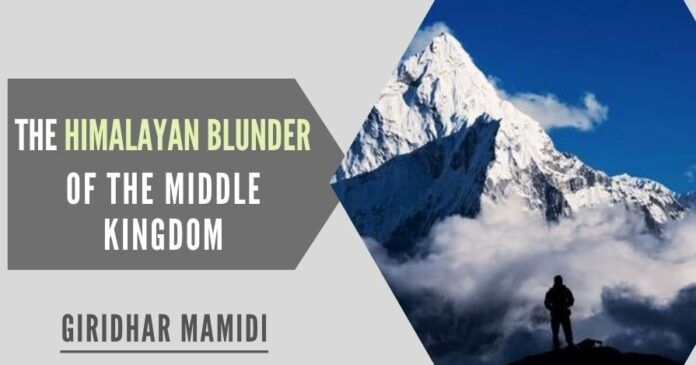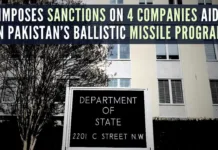
Chinese were confronted by the Indian team, the Chinese army was rude, abusive and turned aggressive by pushing and intimidating the Indian side
What took 45 years of painstaking diplomacy and conscious investment in peace and tranquility on the Indo-china border was undone in less than six hours of madness on the night of June 15, 2020. The unprecedented and lethal attack on a small contingent of 16-Bihar Regiment walking up to Patrol Point (PP14) at the Galwan valley in Ladakh, taking them by surprise, resulted in the first casualties on the un–demarcated border between India and China. As the reports keep trickling in, the picture is getting clearer now.
The Lieutenant-General level agreement to disengage from areas of Chinese incursions at various points on the Line of Actual Control should have been a routine exercise like it was several times before in the last three-four decades. While the commanders on the Chinese side honored this agreement and disengaged from PP 15 and PP 17A, the Chinese contingent at PP 14 too appeared to do so, but when a contingent of 16-Bihar regiment commanded by Col Santosh Babu went to verify the implementation of the Disengagement agreement, they were in for many surprises. Galwan valley, LAC was not a point of dispute between the two countries since 1962. And patrol parties from China and India used to meet at PP 14 regularly, with no untoward incident for all these decades. Over the period, both the teams at this engagement point had developed a certain degree of comfort and familiarity.
The Prime Minister Sri Narendra Modi observed a two-minute silence in their honor in full public view. Contrast this with the way Chinese have not even acknowledged the casualties on their side.
The first surprise for Col Santosh Babu’s team was that they saw a completely new and unfamiliar Chinese contingent at the spot. The second surprise was a temporary tent that was erected overnight in complete disregard to the Disengagement understanding. When the Chinese were confronted by the Indian team, the Chinese army men were not only rude and abusive but also turned aggressive by pushing and intimidating the Indian side. Indian side stood firm in their resolve and burnt the tent erected by the Chinese. The third and shocking surprise that the Indian boys in fatigues were the preplanned, premeditated use of primitive rods with deadly nails and baseball clubs with barbed wiring twined around. Out of the blue, without any warning, the Chinese side struck lethal blows on the head of Col Santosh Babu and two of his boys. Seeing their Commanding Officer fall to the ground, was the last straw to the Indians and it started deadly fist-cuffs resulting in high casualties on both sides.
As per Standard Operating Procedure, a support team comprising of Ghatak contingent of the Indian army, which came to check on the first patrol party, came to the rescue of their colleagues fighting the Chinese. It is understood from reliable sources that the Indian counter-attack was extremely strong resulting in the brutal killing of many Chinese soldiers in hand-to-hand combat. The river gorge being very narrow, a portion of it caved in under the weight of large Chinese troops. Several Chinese soldiers died in this landslide and due to hypothermia in the chilly water of Galwan river. The chaos went on till midnight when exhaustion stopped the fight resulting in 20 casualties on the Indian side including the Commanding Officer Col Santosh Babu and more than 43 casualties on the Chinese side including their Commanding Officer. As day dawned, the brutality of the fight was there for the Chinese to see. They had 10 Indian army men under their custody, while the Indian side also had a few Chinese soldiers. Within six hours of the end of this fight, the Chinese side requested for calming down the situation and wanted to resolve it. The dead bodies of casualties were exchanged between the armies with an uneasy calm prevailing in the Galwan valley.
India announced the names of all it’s 20 martyrs and their funerals were held publicly as the entire nation bid them farewell. Their sacrifices were properly honored by the entire country. The Prime Minister Sri Narendra Modi observed a two-minute silence in their honor in full public view. Contrast this with the way Chinese have not even acknowledged the casualties on their side. Neither did they name their martyrs nor were there funerals made public. The ultimate sacrifice any soldier gives to his nation is martyrdom on the battleground. And the least we can expect from his nation is gratitude for his sacrifices. The Chinese behavior of ignoring and covering up the martyrdom of their soldiers shows utter disregard for sacrifices and for the right of their citizens to offer their tributes to their fallen countrymen. Which civilized nation would want to hide the valor and martyrdom of their soldiers?
There are reports that the Chinese had built a few dam-like structures on the Galwan river to control the flow of water so as to flood the Indian side at the time of their choosing. Reliable sources have confirmed that the Indian army destroyed at least one such dam-like structure across the LAC.
If the intention of Beijing was to continue hostile posturing with India, the disengagement talks could have been derailed or new incursions across almost 3800kms LAC could have been attempted.
The motivation and the reasons for the Chinese adventurism on the LAC in the midst of a pandemic of Chinese Wuhan Coronavirus are not just baffling, but also beats conventional logic. While the official reason mentioned by the Chinese side for their ‘actions’ is, infrastructure building by India on its side of the LAC, that excuse doesn’t seem to hold. The Shyok-Daulat Beg Oldi Road was under construction for more than 5 years, and so the Chinese excuse at this time doesn’t fit the logic.
The plausible reasons for the Chinese behavior this time could be because of –
- Xi Jinping‘s need for diverting internal pressure within China, which is severely impacted by the virus.
- While all the countries of the world are busy battling the fallout of the virus, China saw an opportunity to alter it’s boundaries while the neighbors were focusing elsewhere.
- The need for Xi Jinping to push his people into a nationalistic frenzy so that they don’t challenge his authority or that of the Chinese communist party.
- The recently held National People’s Congress in Beijing threw up a few challenges to Xi Jinping, which were not put out in the public domain. To stave off those challenges, he adopted an aggressive attitude towards all his neighbors. Effectively ending, the one-nation, two-systems rule In Hongkong, sinking the fishing boats of Vietnam in its own sea-waters, threatening an invasion in Taiwan, staking unilateral and unreasonable claims on the territorial waters of its neighbors in the South China sea, threatening Japan over its Senkaku islands, and last but not the least, opening up new fronts on the LAC with India, where there were no disputes earlier.
While the aggression on the LAC was expected, especially after Xi-Jinping asked his army to be ready for war during a speech at the National People’s Congress, the situation was being normalized after the Indian Army, Indian Airforce, and Indian Navy mobilized their forces in full battle-preparedness, as was seen during June 6, 2020, meeting between the two armies, where a Disengagement agreement was drawn up.
While the Disengagement at all other points went on as per the agreement, the rogue-action of the Chinese army at PP 14, seems to be an act of defying the orders of their own Lt General. If the intention of Beijing was to continue hostile posturing with India, the disengagement talks could have been derailed or new incursions across almost 3800kms LAC could have been attempted. While the entire LAC was without any incident, the brutality at PP 14 sounds illogical and probably localized. By gaining a few meters of territory, or the killing of Indian soldiers, China would be the biggest loser, not just with its relationship with India but also in it’s standing in the world. The pandemic has left lakhs of Chinese workers unemployed. Should India retaliate on Chinese imports the problems for Chinese companies would compound significantly? Such a misadventure would change the status quo of India’s long-standing policies against china. The spirit of Wuhan and Mahabalipuram would evaporate with one such incident. So it beats logic and traditional wisdom as to why Beijing would stoop to such brutality for a few meters of territory against another nuclear-armed giant neighbor.
There are reports which are emerging that an ambitious General by the name Zhao Zongqi who was in charge of the Western command since 2016, had two reasons for doing this at PP 14. He was the same general who ordered his troops to quietly capture the Bhutanese territories in the Doklam area in 2017. He had expected some verbal protests from India and Bhutan, and that both countries would not take any action beyond rhetoric. Massive hysteria was built up through the Chinese media assets to discourage and scare India into submission like it traditionally did for many decades before. The firm response from India which showed the will to push the envelope hard, for as long as it takes, shocked General Zhao and the think-tank in Beijing. And they had to ultimately back down at the end of 73-day stand-off, it was a big embarrassment and failure of General Zhao, and to the powers in Beijing. The Doklam standoff had given courage to the other neighbors of China that China can be handled without falling in the trap of their propaganda threats.
General Zhao is a Vietnam war veteran, but after Xi Jinping took over the reins of power in China, he saw many of his contemporaries like General Zhang Youxia take over the vice-chairmanship and other important positions in the Central Military Command, of which Xi Jinping is the chairman. So General Zhao had an axe to grind against India for Doklam and also had to give some piece of additional real estate on the birthday of Xi Jinping to stake his rightful claim to the position of Vice-chairmanship in CMC. His misadventure has backfired on him spectacularly and had also put Xi Jinping in a very precarious position. Tackling the Americans on various fronts including trade, Hongkong, Taiwan, Xinjiang, Tibet, and the South China Sea, Xi Jinping could have best avoided the complete loss of trust with India.
For the petty ambition of grabbing a few meters of real estate from India by an impatient general, the Middle Kingdom seems to have made a blunder of Himalayan proportions, from which it may find it difficult to extricate itself.
Note:
1. The views expressed here are those of the author and do not necessarily represent or reflect the views of PGurus.
- Crumbling throne of the Dragon - November 4, 2023
- Saving the Hindus of Bangladesh - August 14, 2023
- Time for Bharat to take over from India - May 24, 2022











The article is lucid and informative on what a common citizen wants to understand about the development and for the first time a reader like me is able to grasp how the anti nationals in the Indian political scene twist the real picture with a deliberate aim to help the adversary country. The author has provided clarity not only on various aspects of Galwan event bringing out the unexpected premeditated Chinese rogue attacks on Indian army warriors resulting in casualties and the retaliatory lessons by Indian army to the enemy in very good measure, but also on the Doklam episode. The author deserves a big credit.
Very informative , well written. Covering all the aspect . One point , which you missed is , I think land grab is for , isolating the siachin glacier
Very informative and enlightening.
Thank you for writing this and giving so much clarity on the issue.
Keep Writing… more power to you.